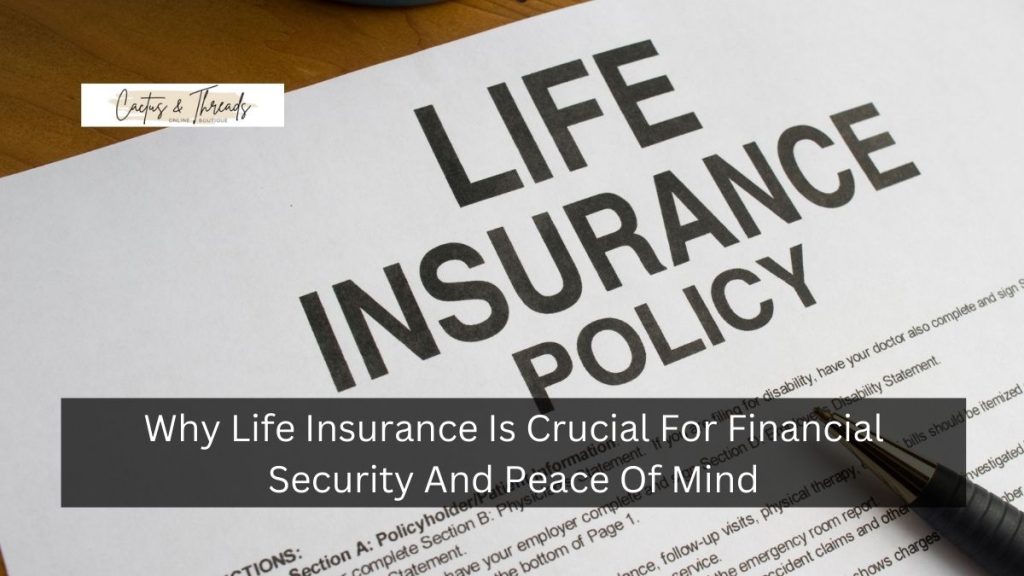
In today’s uncertain world, it’s important to make sure your family will be financially secure in the future. Life insurance is a key part of this, providing a safety net to protect your loved ones if something happens to you. This article explains why life insurance is essential for giving you peace of mind.
Understanding Life Insurance
Life insurance is an agreement between a person and an insurance company. The person pays money regularly & in return, the insurance company promises to give a lump sum of money, called the death benefit, to the person’s chosen loved ones when they pass away. This money can help the family continue to live comfortably & pay for different costs.

Key Benefits of Life Insurance
- Financial Security for Dependents Life insurance is meant to provide money for the family of the person who passed away so they can still pay for things like bills, the house, and education.
- Debt Repayment Outstanding debts, such as mortgages, car loans, or credit card balances, do not disappear upon death. Life insurance can cover these liabilities, preventing the burden from falling on surviving family members.
- Coverage of Final Expenses Funerals and related services can be costly. Life insurance can alleviate the financial strain associated with end-of-life expenses, allowing families to focus on grieving without added financial stress.
- Estate Planning and Taxes For individuals with substantial estates, life insurance can be a strategic tool in estate planning. It can provide liquidity to pay estate taxes, ensuring that assets are preserved for heirs.
- Business Continuity For business owners, life insurance can fund buy-sell agreements, ensuring a smooth transition of ownership and providing financial stability to the business during challenging times.
Types of Life Insurance
Understanding the different types of life insurance is crucial in selecting the right policy:
- Term Life Insurance: Offers protection for a set amount of time, usually 10, 20, or 30 years. It is usually cheaper & good for people who want coverage while they are working.
- Whole Life Insurance: Offers lifelong coverage with a savings component that builds cash value over time. Premiums are higher but remain fixed throughout the policyholder’s life.
- Universal Life Insurance: A flexible policy that combines death benefit protection with a savings element. Policyholders can adjust premium payments and death benefits within certain limits.
Determining the Right Coverage Amount
Calculating the appropriate amount of life insurance involves assessing various factors:
- Income Replacement: Consider how many years your family would need financial support & multiply your annual income by that number.
- Debt Obligations: Sum all outstanding debts, including mortgages, loans, and credit card balances.
- Future Expenses: Account for anticipated costs such as children’s education, weddings, and retirement needs for a surviving spouse.
- Existing Assets: Review how much money you have saved, invested, and other things you own that can help pay for expenses without needing insurance.
Factors Influencing Premiums
Several elements affect the cost of life insurance premiums:
- Age: Younger individuals typically enjoy lower premiums.
- Health Status: Good health can lead to more favorable rates, while pre-existing conditions may increase costs.
- Lifestyle Choices: Habits such as smoking or engaging in high-risk activities can result in higher premiums.
- Policy Type and Term Length: Permanent policies and longer terms generally come with higher premiums.
The Role of Life Insurance in Financial Planning
Incorporating life insurance into a comprehensive financial plan offers several advantages:
- Risk Management: It mitigates the financial risks associated with premature death.
- Wealth Preservation: Ensures that assets are transferred to beneficiaries as intended.
- Charitable Giving: Policies can be structured to support charitable organizations, leaving a lasting legacy.
Common Misconceptions About Life Insurance
Addressing prevalent myths can help individuals make informed decisions:
- “I don’t need life insurance because I’m single.” Even without dependents, life insurance can cover debts and final expenses, preventing them from becoming a burden on others.
- “Employer-provided life insurance is sufficient.” Group policies often offer limited coverage, which may not meet all financial needs.
- “Life insurance is too expensive.” Various policy options are available to fit different budgets, and the cost of premiums can be offset by the peace of mind provided.
Conclusion:
Life insurance is more than just a financial product; it’s a commitment to safeguarding your family’s future. By providing financial security, covering debts, and facilitating estate planning, life insurance offers unparalleled peace of mind.
Evaluating your individual needs and consulting with a financial advisor can help you choose the right policy to ensure that your loved ones are protected, no matter what the future holds.







